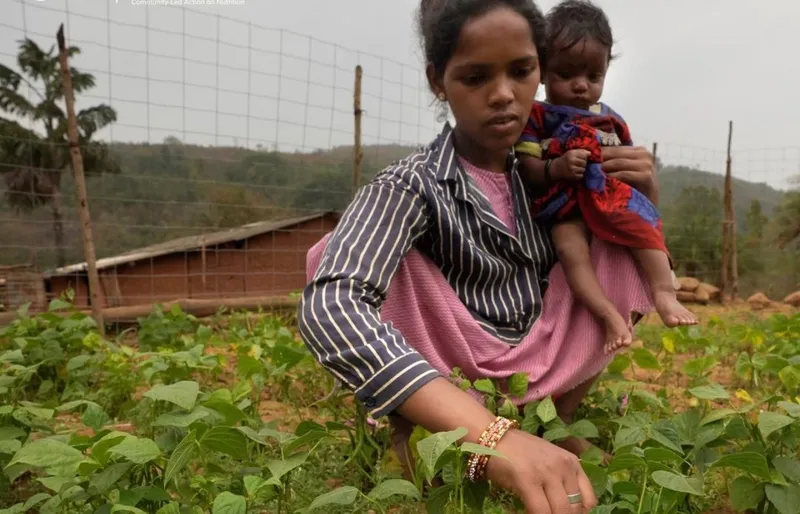Tribal women in Odisha are stepping up to fight malnutrition, one meal at a time
Trained by Vitamin Angels India, a nonprofit working in communities stricken by malnutrition, ‘Poshan Ma’elis’ are changing decades of undernourishment plaguing their communities.
At 4 am every day, Sumati Pradhan wakes up to take care of her family of 20 members. The 22-year-old cooks and cleans the house but she spends most of her day in the kitchens of her neighbours in Tembli village, Odisha. She checks on other families, asks them what they ate for the day, and helps them care for their kitchen gardens.
Sumati is a Poshan Ma’eli, or ‘nutrition leader’, trained to help her village fight malnutrition.
She is among the eight women trained through an initiative of Mumbai-based non-profit Vitamin Angels India (VAI) to address malnutrition in vulnerable communities, including tribal women in Odisha’s Kandhamal district from where Sumati hails. She was elected by her community to become a Poshan Ma’eli, being among a handful of women to graduate from school.
In March 2023, VAI visited Kandhamal district for an intervention programme and found that pregnant mothers in three villages—Tembli, Kanjumaha and Padami—were suffering from severe anemia.
“Despite the region being naturally conducive to and abundant with nutrient-rich produce including figs, dates, tamarind, and turmeric, the tribal communities, who have been living here for over a century, lacked the nutritional awareness to incorporate them into their diet,” says Animesh Rai, Senior Manager - Implementation Science at VAI, who leads the programme in the region.
“For generations, they were consuming rice with salt or chilli as staples,” he tells SocialStory.
As per the National Family Health Survey-5 (NFHS-5), between 2019 and 2020, 53.4% of pregnant women and 48.8% of non-pregnant women in Kandhamal district were anemic.
In addition to malnutrition, villages in the region scored poorly in other social determinants too as healthcare and education remain largely inaccessible.
“The nearest hospital is 40 km away and schools have poor enrollment, as children have to walk 6-7 km to get to them,” says Rai. “This fuelled us to start our intervention by bringing about self-sustainable changes that were possible right away. Empowering the community to utilise their own natural resources was the perfect jumpstart to this programme.”
The prevalence of severe acute malnutrition among preschool children has been on a steady rise in India over the last two decades. It increased from 6.6% in 2005–2006 to 7.5% in 2015–2016 as per NFHS data. In 2022, a team of researchers from IIT Madras found that maternal and child malnutrition were the most serious health risks in India, accounting for 15% of the country’s total disease burden. Their study also revealed that India lags behind when it comes to nourishment, with high levels of anemia in women of reproductive age.
An undernourished mother inevitably gives birth to an undernourished child, perpetuating an intergenerational cycle of malnutrition.
Creating trailblazers
Over the last year, VAI has upskilled women including Sumati to recognise the region’s rich natural resources and the health benefits of consuming locally grown fruits and vegetables.
It has trained eight Poshan Ma’elis so far to lead ten groups of women who share their lands to collectively grow and take home vegetables like carrots, long beans, radishes, tomatoes, spinach, and drumsticks. VAI provided the community with organic seeds at the beginning of the programme, and this has enabled a sustainability movement by women-led self-help groups in the villages.

Vitamin Angels has trained eight Poshan Ma’elis so far to lead ten groups of women who share their lands to collectively grow and take home vegetables like carrots, long beans, radishes, tomatoes, spinach, and drumsticks.
VAI has partnered with local NGO Kandhamal Jilla Sabuja Baidya Sangatha to implement the programme. The NGO introduced new recipes to the locals by surveying the region, taking photographs, and foraging the fruits, vegetables and greens growing in their forests.
“We consciously avoided taking resources off the internet because we did not want to alienate the villagers in any way from what they already knew and the cultural practices they held dear. We put together food festivals in community kitchens to help them witness and adopt better dietary practices,” says Dinbandhu Maharana, who works with the NGO.
“We also chose to train the community women in large groups, which inspired them to exchange knowledge and ideas, and experiment with what they learnt in their kitchens. The most educated women who could read Odiya and take these resources into the villages were elected as Poshan Ma’elis,” says Maharana, a local himself who engages with the women in the tribal language of Kui.
Sumati says VAI’s engagement programme hasn’t just transformed how the villagers eat but also live.
“Food was really the least of our concerns. We lacked the basic sense of hygiene—personal and maternal—and healthy sanitation practices. While illnesses were common, we either relied on the natural herbs found in the forests, or, in grave situations, sought help from religious priests. This led to high instances of morbidity too,” she says.
For Poshan Ma’elis, transitioning from taking care of their own families to guiding their communities towards better health has been taxing. But it has also been rewarding to see the health of villagers improve after switching to nutrient-dense diets.
“As leaders, we must first inspire change within our homes. From a time when every second woman wore pale yellow eyes, and battled severe fatigue and immunodeficiency, they now see that change is possible and most importantly, accessible,” says Ruta Pradhan, another Poshan Ma’eli from Tembli.
“The number of hours I spend on my feet has increased but the sense of fulfilment is new and exciting.”
Edited by Kanishk Singh







